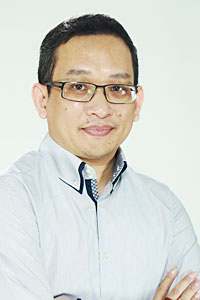
Democracy is certainly not about everyone being free to get what they want and as much as they want. If everyone can lay their hands on everything they want there will be anarchy.
Democracy is not synonymous with freedom, or to be more precise, unrestrained freedom.
Even in the freest of societies, freedom exists within an invisible frame around each person and when frames collide, disputes emerge. When disputes cannot be reconciled, the law steps in and decides who is at fault.
This is a friend's attempt to explain what democracy is in the context of spatial as opposed to collective freedom. If that explanation holds validity, I wonder if it means the majority cannot have everything they want either.
Renowned freedom fighter Aung San Suu Kyi speaks of democracy as a compromise which the minority has to accept although, in Myanmar, the majority manifests itself in two parallel universes. Mrs Suu Kyi and her opposition National League for Democracy Party are hugely popular across large sections of the populace and yet her party accounts for less than 10% of the members of parliament.
But a compromise also has to have a frame around it. Just as the majority should not be handed a blank cheque to do what they want, the minority should not allow themselves to make the kind of concession that makes them abandon a stand or stray from a principle or cherished value and bend to the will of the majority.
In short, a compromise should not be a knee-jerk reaction, and no one should compromise for the sake of compromising.
We must tread the precarious field of compromise mindfully to find and maintain the right balance to keep from going overboard with it.
But such a balance may be hard to grapple even for Mrs Suu Kyi, who raised CNN's Christiane Amanpour's eyebrows when she spoke during an interview with the correspondent of how she likes a lot of the generals in Myanmar's army.
Ms Amanpour was stunned to hear "generals" and "like" in the same sentence uttered by the icon of democracy. Many might have expected her to give the oppressive regime a piece of her mind.
When asked in other interviews what her days under house arrest were like, she replied that she whiled away the time reading and listening to the radio. An aura of burying the past and moving on pervades the interviews.
And Myanmar's abrupt transition to democracy was being played out swiftly. Mrs Suu Kyi was released from house arrest and went globe-trotting to collect numerous awards while driving home her country's problems and inadequacies that need to be addressed.
All the while she was praising Myanmar President Thien Sien for launching reforms that are returning the country to the path of democracy.
Before anyone could second-guess the success of the reforms, President Barack Obama and Secretary of State Hillary Clinton had set foot in Myanmar, although the visit by the first sitting US president to that country was strategically to keep China's immense influence in the "reformed country" and the wider region in check.
Just as questions were being asked about whether Mr Obama's visit came too early, having been arranged barely weeks after his re-election to office, some observers were also asking if Mrs Suu Kyi was too quick to receive guests when there was no telling if the regime-designed transition was not merely cosmetic.
Some foreign affairs analysts observed how the junta appeared to have made some startling compromises which were unthinkable a few years ago, from releasing Ms Suu Kyi from her house arrest, permitting her to contest the by-elections that swept the NLD to parliament, allowing her to be the face of Myanmar through her many high-profile foreign visits and even allowing her to come across as an alternative leader in the making.
So who is the minority and who is the majority in Myanmar then? For now, the old guard remains the majority occupant of parliament although outside Naypyidaw the contrast is starkly revealing.
The assumption, therefore, is that parliaments do not always embody the voices of the majority but it is here that the country's interests are carved up. President Obama may have paid a warm visit to Mrs Suu Kyi's lakeside home in Yangon and pledged to work with her in repairing Myanmar's wrecked democracy but it is in the imposing marble halls of Nay Pyi Taw that the lynchpin of US-Myanmar deals will be inked. Whether real or perceived, the majority rules.
Kamolwat Praprutitum is an Assistant News Editor, Bangkok Post.
